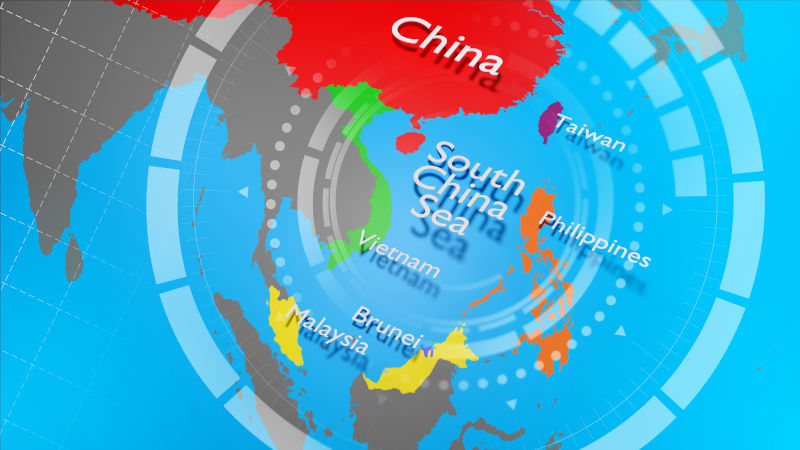The South China Sea: countries in glass houses should not throw stones
May 27, 2023
The Philippines publicly announced that it is deploying navigational buoys near some of the rocks it claims and occupies in the South China Sea. It says the buoys signify “the country’s sovereign rights and jurisdiction over our EEZ” and has warned of “serious repercussions” if China removes them. This was just its latest provocative and hypocritical action in the South China Sea.
The Philippines often complains about China’s aggressive behaviour and actions that violate comity and international law of the sea. Indeed, in April the Philippines and U.S. criticised China for “its unlawful maritime claims, militarisation of reclaimed features and threatening and provocative activities in the South China Sea,”_ _ including the repeated massing of maritime militia vessels in the Philippine Exclusive Economic Zone (EEZ).” The Philippines also accuses China of being disingenuous in its expressions of its intent. The criticisms of China’s policies and actions in the South China Sea have some validity—at least in the eyes of rival claimants and the U.S.. But the Philippines is guilty of many of the same sins in principle if not degree.
The Philippines claims that it is deploying the buoys to fulfill its “commitment under international law to install and maintain these aids to navigation that assist vessels in safe passage in our waters.” But it neglects to acknowledge the provocative nature of this act and these statements.
The problem is that sovereignty over the features (rocks) above high tide is disputed. China claims sovereignty to all the features in the South China Sea and views the occupiers of its claimed features as violating its sovereignty. To support a claim to sovereignty over features above water at high tide, a country must demonstrate continuous, effective occupation or control and acquiescence by other claimants. None of the claimants including China and the Philippines can demonstrate this. Thus China’s claims are just as valid as the others. Vietnam which claims the features and their territorial seas also criticised the Philippines for “violating its sovereign rights” by deploying the buoys. Even the Philippines ally the U.S which is constantly meddling in the South China Sea does not take a position on the sovereignty of the features.
So the political and legal nature of the act depends on the exact location of the buoys. Any that are deployed within the 12 nautical mile territorial sea of high tide features claimed by China are a provocative challenge to China’s claims.
The Philippines often accuses China of violating the ASEAN –China 2002 Declaration of Conduct of Parities in the South China Sea (DOC). But placing of buoys around disputed high tide features probably violates the DOC provision that urges the “exercise [of] self-restraint in the conduct of activities that would complicate or escalate disputes”.
Similarly the Philippines frequently complains of China’s vessels ‘swarming’ around features it claims and even those it occupies. But if China’s vessels are within the 12 nautical miles territorial sea of its claimed high tide features they are there legitimately regardless of who occupies them. Moreover those vessels outside the territorial sea may claim freedom of navigation especially if they are on their way to or from China’s claimed territorial waters. This can include anchoring in other’s EEZs pursuant to the clause on freedom of navigation in the EEZ in the UN Convention on the Law of the Sea (UNCLOS) that includes “other internationally lawful uses of the sea related to these freedoms, such as those associated with the operation of ships”.
The Philippines has violated the DOC before. In 2017, the Philippines began to build shelters for fishers on some unoccupied sandbars. China claimed that the Philippines had violated the DOV provision reason that forbids “inhabiting on the presently uninhabited islands, reef, shoals, cays _ _ _.” President Rodrigo Duterte ordered the construction to stop and the shelters to be dismantled.
As for militarisation of features, the Philippines’ military occupies at least eight rocks in the South China Sea. In principle this is no different from what China has done.
The Philippines also violates UNCLOS. It claims that its archipelagic waters – essentially all the waters enclosed by lines between its legitimate outermost islands-are internal waters. This means that it did not recognise the right of innocent passage or sealane passage within them.
In a 1986 protest of this position, the U.S. stated that “ …as generally understood in international law, including that reflected in the 1982 Law of the Sea Convention, the concept of internal waters differs significantly from the concept of archipelagic waters. Archipelagic waters are only those enclosed by properly drawn archipelagic baselines and are subject to the regimes of innocent passage and archipelagic sea lanes passage.
Moreover the U.S. has backed up its objection by undertaking Freedom of Navigation Operations using its warships to demonstrate its position.
The Philippines claims sovereignty over the waters around, within and adjacent to the “Kalayaan Island Group” on the basis of proximity, national security and economic need. [Sec. 1, Administrative Order No. 29 2012] In particular this claim includes sovereignty over the “sea -bed, sub-soil, continental margin and airspace.” Such a claim has no basis in UNCLOS.
Perhaps the most egregious Philippine hypocrisy is its claim to not be in the U.S. camp versus China. It says it is “a friend to all, enemy to none”.
This statement flies in the face of the Philippines’ recent lurch towards the U.S., particularly in military relations. Although it denies the degree of its ‘pivot’, China and the world can see that it is being integrated into the US strategy to militarily surround and contain China.
The point is that there are no angels in the South China Sea. Both China and the Philippines are guilty of aggressive behaviour, violations of the Law of the Sea, and being disingenuous in expressions of intent. Countries in glass houses should not throw stones.




